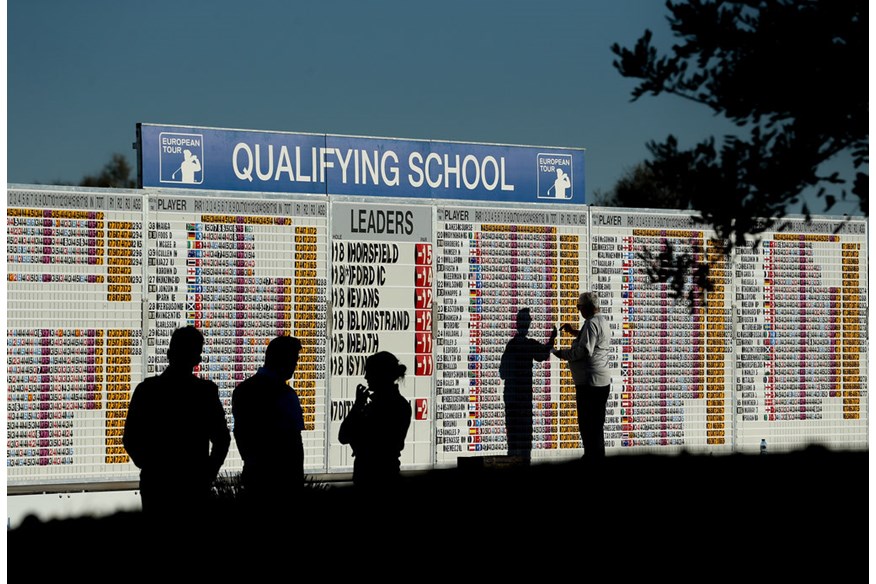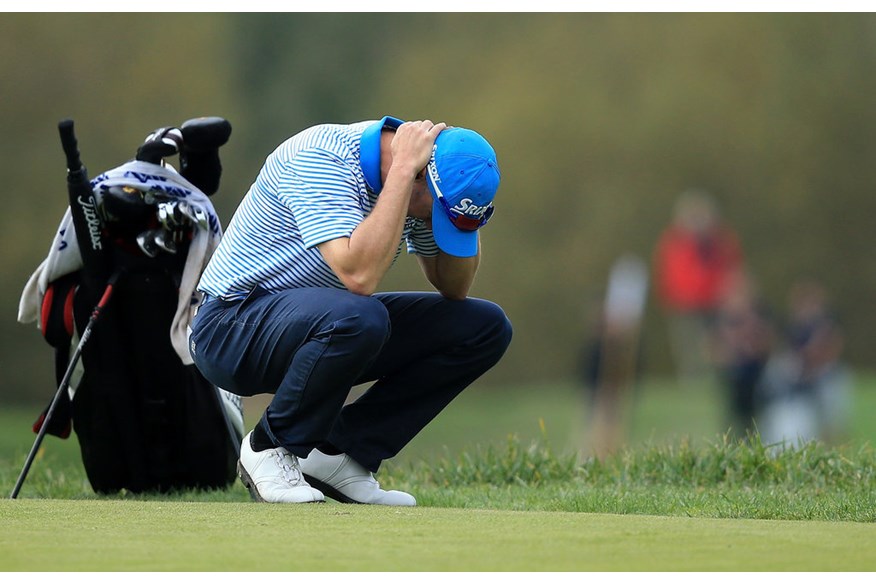European Tour Q-School: The school of hard knocks
Last updated:
Thousands apply, but only 25 players win a golden ticket to get on to the European Tour. And to earn it, they’ve got to battle through Q School – a place where dreams are made and hopes are crushed every year.
[The final stage of European Tour Qualifying School is currently underway – click here for the leaderboard]
As one golfer throws his arms up in celebration, another trudges off in tears. Welcome to the cut-throat world of European Tour Qualifying School. In the region of 1,000 hopefuls take part every year, praying that they can earn their place among the elite.
Since its inception in 1976, Justin Rose, Colin Montgomerie and Padraig Harrington have all been through its doors, while others like Ian Woosnam and Miguel Angel Jimenez have been regular visitors.
In total, 22 Major champions have been to Q School, and many more have gone on to represent Europe in the Ryder Cup. But for every success story, there are dozens of tales of amateurs gambling away their life savings and failing to make the grade.
The €1,800 entry fee has even been known to price some people out, ending careers before they’ve even started. As one club pro, who wishes to remain anonymous, told us: “Selling Mars Bars at a golf club and teaching kids at the weekend might be less glamorous, but it pays the bills and carries far less risk.”
Starting at stage one, a player without any status on Tour will have to withstand 252 holes of hard graft for the chance to win their place on the world’s second richest circuit. Their journey can begin as early as September and end with six rounds in as many days in November.
“It is grinding,” says Sam Horsfield, who was one of just two players to win his card in 2017 after progressing through all three stages. “What a lot of people don’t realise is that the Second Stage ends only a few days before the Final Stage starts. So, you’re actually playing 10 rounds in the space of about 14 days.
“It’s tough. I actually think the Second Stage is the hardest to get through because you only have four rounds and you’ve got to eliminate the big numbers. It’s definitely the most nerve-racking.”
Though he is perhaps best remembered for storming to an eight-shot victory in the Final Stage of Qualifying, Horsfield doesn’t mind reminding people that he was one shot away from missing out altogether.
“I had to birdie the last hole of the Second Stage to make it through to a play-off. I then hit probably the best shot I’ve ever hit. The rest is history.”
Horsfield hasn’t been back to Q School since, which is more than can be said for all but four of his class of 2017. By comparison, only six graduates from last year managed to keep their card again for the 2020 season.

The rest are back at Lumine Golf Club in Spain for the Final Stage of Qualifying this week, battling to finish in the top 25 and ties so they could win their membership back.
They have the consolation of knowing that they could drop down to the Challenge Tour, but not everyone is so lucky. Failure to earn one of the 156 spots in the field for the Final Stage means you leave with nothing but regrets – and a hefty bill.
“There’s a black and whiteness to Q School which doesn’t exist in many tournaments,” explains Eddie Pepperell. “Nobody really wants to be there.It can really beat you up and you can beat yourself up. It can be nasty because it is all or nothing.”
Pepperell admits his lowest moment came when he lost his card in 2016, and spent the rest of the day “crying his eyes out” in his hotel room. Down but not out, he teed it up just weeks later and regained his card at Q School.

“There were a lot of tense players that week,” he says. “I wasn’t that uptight or anxious, whereas a lot of guys were and probably played themselves out of contention. I remember I played with Richard McEvoy in the sixth round and he was bleeding at the end. He made a great par on the last to get the last card, but to watch him go through that… I mean, bless him, he was struggling.”
Those who drop down to the Challenge Tour may still retain some status on the European Tour, and are eligible to win their card if they finish in the top 15 of the money list. It’s a situation Richard Bland found himself in this season, and has now worked his way back to the top table after finishing third or better five times.
“I do have great respect for guys who come back because it isn’t easy and really shows a lot of determination,” says Oliver Fisher, who has experienced both success and failure at Q School. “It just goes to show that Q School isn’t the be all and end all. You can still go and play well on the Challenge Tour and get your card back again.”
Simon Dyson, a six-time winner on the European Tour, had the chance to take up Challenge Tour membership after missing the cut at Q School last year, but opted against it and has now “semi-retired” from golf at the age of 41.
“I don’t regret it at all,” says Dyson, who has set up his own academy at Mottram Hall in Cheshire. “I gave it a go on the Challenge Tour but I’ve got so much going on now. I mean, what’s the point of doing something you don’t want to do?”
On the other hand, the decision to return to the Challenge Tour paid off for 46-year-old Richard Bland. Following his 15th place finish in the Challenge Tour Grand Finale, Bland ended the year in third place in the Race to Mallorca rankings to regain his European Tour card.
What doesn’t help is that only the top 15 on the Race to Mallorca earn European Tour membership. And then there’s the money to consider as well. The biggest purse this season on the Challenge Tour was €420,000, around half-a-million Euros less than the smallest payout on the European Tour this year.
“Motivation can be one of the biggest issues,” admits Nick Dougherty, who had full playing rights on the European Tour for 10 years. “For an up-and coming player, sitting it out on the Challenge Tour might not seem that bad. But when you’ve won three times on Tour, that’s a big come down, believe me.”
Dougherty spent half a decade trying to make his way back to the European Tour. By the time he retired in 2016, he’d failed to win on the Challenge Tour or make the cut in five attempts at Q School.
“It speaks volumes that I actually remember every experience at Q School as vividly as the tournaments I won,” says Dougherty. “When I turned up at Q School in 2011, I knew I would be playing with people who wanted to scalp me. Some were almost half my age, playing without fear, and it was soul destroying. My mind was frazzled and I didn’t even make it through to the last 36 holes.
“I went back to Q School another four times after that and didn’t fare any better. People liken it to a marathon, but it actually feels more like a sprint because you’ve got six rounds to decide your future. There are no second chances, at least not for another year, and the hardest competitor you face is yourself.”

The finality of it all is what convinced former European Tour star Jamie Spence to sacrifice his chances of winning the 2003 Mallorca Classic, out of fear of losing his Tour card and going to Q School.
“I needed to finish in the top four in Mallorca, the last tournament of the year, to keep my card,” he told the Sky Sports Golf Podcast. “I stood on the last tee and had to birdie it to force a playoff against [Jose Maria] Olazabal and Jimenez. It was a 3-iron to get to the flag, but there was out of bounds long. I knew I couldn’t make two with a 4-iron, but I could have lost my card if I played 3-iron…”
Spence chose the safer option and escaped with a bogey to finish third. He never did win again on the European Tour, but he did keep his card for another year. It’s the reason why he defended Bernd Ritthammer after he opted against going for the green in two at the par-5 72nd hole at the European Open, despite needing a birdie to force a play-off.
“Can you blame him when thousands of pounds and ranking points are on the line?” asked Spence. His argument was that while the difference between finishing second and third might mean little to a Rory McIlroy, it’s a big deal for many of the lower-ranked players.
Tour veteran Graeme Storm can relate to that, and told us last year that he had spent “many nights” worrying about where his next pay cheque was going to come from.
Everything came to a head in 2016 when he only kept his card because Patrick Reed failed to play in enough events to keep his. It meant Storm didn’t have to make the trip to Q School – an experience he describes as “a lot harder than competing in a Major” – and was able to play in the South African Open just weeks later, which he went on to win by beating McIlroy in a play-off.

Storm considers his story to be something out of a fairytale, but you do not have to search too hard to find horror stories, too. Only last month, Paul Dunne, winner of the 2017 British Masters, missed his 12th cut in 14 starts at the Portugal Masters and had to give up his card alongside the likes of Ryder Cup star Jamie Donaldson and Lee Slattery.
All three are past winners on the European Tour, now facing uncertain futures: Dunne withdrew from Q-School with an injury prior to the tournament, Donaldson also withdrew after two rounds, while Lee Slattery currently sits at two-over-par after three rounds – making it a tough ask to get back to Europe’s top table.
But Q School cares little for past glories or reputations. It’s the reason why many consider it to be the toughest test in golf. And the cruellest by far.
How it works
The following categories are exempt from the First and Second Stages and automatically qualify for the Final Stage.
- 111th – 145th ranked European Tour members.
- 16th – 45th ranked Challenge Tour members.
- Winner of the last played Qualifying School.
- Winner of the 2018 Challenge Tour Rankings.
Players whose eligibility as a Race to Dubai tournament winner has expired in the last two seasons. - European Tour members ranked 75th or above in the career money list.
- The five leading entrants on August 21 in the Asian Tour Order of Merit.
- The three leading entrants on August 21 in the PGA Tour of Australasia, Japan Golf Tour and Sunshine Tour Order of Merits.
The hurdles you need to overcome to earn your European Tour card through Q School
Get down to scratch
Any male amateur with a handicap of 0.4 or better can enter European Tour Qualifying School. Eligibility also covers anyone who has appeared between positions 1-2,000 of the World Amateur Golf Ranking in the same calendar year.
Pay the entry fee
All applicants must pay £1,800/$2,030. You also need to cover travel, accommodation and expenses on top of that.
First Stage of Qualifying
Played over 72 holes of strokeplay, applicants from around the world can choose from one of nine different venues in England, Germany, Sweden, Austria, Italy, France or Portugal. This year, a record-breaking 842 players participated, but only 183 progressed to the next stage (plus players exempt from First Stage). The required score varied from eight under par in Austria and Italy to level par in Sweden and one over par in Portugal.
Second Stage of Qualifying
Four separate strokeplay tournaments are played over four rounds, across four different courses in Spain. Last year, 291 players teed it up and only 95 players qualified for the third and Final Stage.
Final Stage of Qualifying
It all comes down to this. Six rounds to be played in as many days at Lumine Golf Club in Spain. Only 156 players make it this far, and half are eliminated after four rounds. Those who fail to make the cut must make do with a Challenge Tour membership for the following season.
36 holes from glory
The leading 70 players (and ties) face a two-round fight to finish in the top-25 – and ties – to make it to Europe’s top tier. Rounds of 62 and 63 were registered last year and you could have shot six rounds in the 60s and still not made it. The only consolation is that those who miss out earn limited status on the European Tour.
Now for the hard bit…
If you want to keep your membership, you’ll need to either win a tournament or earn enough Race to Dubai points across the season to finish in the top 110 on the Order of Merit. But be warned: The average number of Q-School graduates to retain their card over the past decade is seven.






